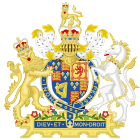Corporation Act 1661 facts for kids
| Act of Parliament | |

|
|
| Long title | An Act for the well Governing and Regulating of Corporations. |
|---|---|
| Citation | 13 Cha. 2 St. 2. c. 1 |
| Dates | |
| Royal assent | 20 December 1661 |
| Commencement | 20 November 1661 |
| Repealed | 13 July 1871 |
| Other legislation | |
| Repealed by | Promissory Oaths Act 1871 |
|
Status: Repealed
|
|
| Text of statute as originally enacted | |
The Corporation Act of 1661 was a law passed by the Parliament of England. It was part of a group of laws called "test acts." These laws were made to make sure that only members of the Church of England could hold public jobs in England.
Contents
What Was the Corporation Act?
The Corporation Act was passed in December 1661 by King Charles II. This was a year after the king had returned to power, a time known as the Restoration. The law was mainly aimed at a group called the Presbyterians. They were a type of Protestant, but they had different beliefs from the Church of England.
Why Was This Law Created?
During the time before the Restoration, England had been a republic called the Commonwealth. After Charles II became king, the Parliament wanted to bring things back to how they were before. Many Presbyterians held important positions in city governments across the country. The Corporation Act was designed to remove them from these jobs.
Rules of the Act
The Corporation Act set out strict rules for anyone who wanted to work in city or town government.
Requirements for Public Office
To be legally chosen for a job in a city or town government, a person had to meet several conditions:
- They must have taken the Christian ceremony of "the Lord's Supper" (also known as the Eucharist) according to the Church of England's rules within the last year.
- They had to take the Oath of Allegiance and the Oath of Supremacy. These oaths meant promising loyalty to the king and recognizing him as the head of the Church.
- They also had to agree with the idea of "Passive Obedience." This meant believing that people should obey the king without question.
- Finally, they had to reject something called the Solemn League and Covenant. This was an agreement that had been important during the Commonwealth period.
If a person did not meet all these requirements, their election to office was not valid.
Impact of the Act
The Corporation Act, along with other similar laws, had a big impact on people who were not part of the Church of England.
Effects on Catholics and Others
Although the Corporation Act was mainly aimed at Presbyterians, it also affected Roman Catholics very much. It was part of a larger set of "Penal Laws" that kept Catholics out of public life.
Over time, fewer and fewer people, even non-Catholics, fully followed these strict rules. Because of this, Parliament would often pass a special law each year called an "Act of Indemnity." This law would protect people from being punished if they hadn't met all the requirements of the Corporation Act. However, this protection was usually only for Protestants.
End of the Corporation Act
The Corporation Act stayed in effect for a long time, throughout the 1700s. It was finally removed in 1828. This happened just one year before the Catholic Emancipation, which gave Catholics more rights in public life.
 | Stephanie Wilson |
 | Charles Bolden |
 | Ronald McNair |
 | Frederick D. Gregory |

